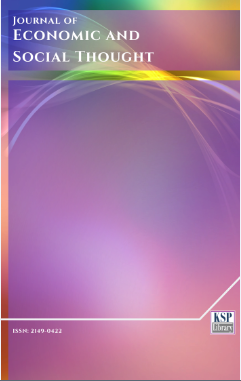Integrating Zakah, Awqaf and IMF for Poverty Alleviation: Three Models of Islamıc Micro Finance
Abstract
Abstract. The objective of this paper is to present theoretical proposals for institutional structure in the context of Islamic Microfinance by first comparing Conventional and Islamic microfinance institutions and then by highlighting some of the pioneering work of conventional microfinance models that paved the way for Islamic Microfinance. In this paper, we review the literature of micro finance models that simultaneously deals with several facets of poverty by combining Waqf and Zakah principles together or individually. There are three models examined in this paper. Waqf-Based Islamic Microfinance Institutions, a Model of Zakah and Awqaf-based MF Organizations and an Integrated Awqaf and Zakah Model of Microfinance. Both Zakah and Waqf mechanisms are considered for Islamic microfinance not only because of their frameworks that are in accordance to the Shariah but they are the original concepts provided in Islam that serve people in need i.e the poor. In tandem with the doctrine of microfinance, Zakah and Waqf are seen as tools best suited to assist the poor who require financing and ultimately could be effective for poverty reduction. The paper derives recommendation for integrating microfinance models into the overall economic policy.
Keywords. Awqaf Funds, Monetary waqf, Zakah, Microfinance, Islamic Microfinance and Poverty.
JEL. G21, I31.
References
Abdelkader, I.,& Salem, A., (2013). Islamic vs Conventional Microfinance Institutions: Performance analysis in MENA countries. International Journal of Business and Social Research, 3(5), pp.219-233.
Ahmed, H. (2007). Waqf- Based Microfinance: Realizing the social role of Islamic Finance. Singapore, Islamic Research and Training Institute.
Ahmed, H., (n.d.) Legal Environment and Nonprofit sector: Implications for Growth of Awqaf Institutions.
Brugnoni, A.G. (2011). Islamic Microfinance Model Needs Changing. Islamic Investor, April.
Fotabong, L.A. (2011). Comparing Microfinance Models
Hassan, M.K. (2010). An Integrated Poverty Alleviation Model Combining Zakat, Awqaf and Micro-Finance. Bangi, Seventh International Conference – The Tawhidi Epistemology: Zakat and Waqf Economy.
Khademolhoseini, M. (N.D.), Cash-Waqf : A New Financial Instrument For Financing Issues: An Analysis Of Structure And Islamic Justification Of Its Commercialization, Imam Sadiq University.
Khaf, M., (n.d.) Role of Zakah and Awqaf in Reducing Poverty: A Proposed Institutional Setting within the Spirit of Shari’ah. Thoughts on Economics, 18(3), pp. 58-59.
Khandker, S.R. (2006). Grameen Bank: Impact, Costs, and Program Sustainability, Phillipines: Asian Development Review.
Leikem, K. (2012). Microfinance: A Tool for Poverty Reduction?, Rhode Island: Economics Commons.
Mahaini, N. (2012). Islamic Microfinance: Unlocking New Potential to Fight Rural Poverty, Italy: International Fund for Agricultural Development.
Man, M., & Abdulwaheed, S. (2011). New Dimension in the Mobilization of Waqf Funds for Educational Development. Kuwait Chapter of Arabian Journal of Business and Management Review, 2(1), 1-2.
Riwajanti, N.I. (2013). Islamic Microfinance as an Alternative for Poverty Alleviation: A Survey. Afro Eurasian Studies, 2(1-2), 255-271.
Slausi, A. (2011). Islamic Microfinance Business Model, Jeddah: Islamic Research and Training Institution, Islamic Development Bank.
Yumna, A.,& Clark, M. (2012). Integrating zakat and Islamic charities with microfinance initiative in the purpose of poverty alleviation in Indonesia. Presented at 8th International Conference on Islamic Economics and Finance
Zarka, M.A. (2007). Monetary Waqf for Micro Finance. Kuwait, Harvard Law School
DOI: http://dx.doi.org/10.1453/jest.v2i3.394
Refbacks
- There are currently no refbacks.
Journal of Economic and Social Thought - J. Econ. Soc. Thoug. - JEST - www.kspjournals.org
ISSN: 2149-0422
Editor: jest@ksplibrary.org Secretarial: secretarial@ksplibrary.org Istanbul - Turkey.
Copyright © KSP Library




